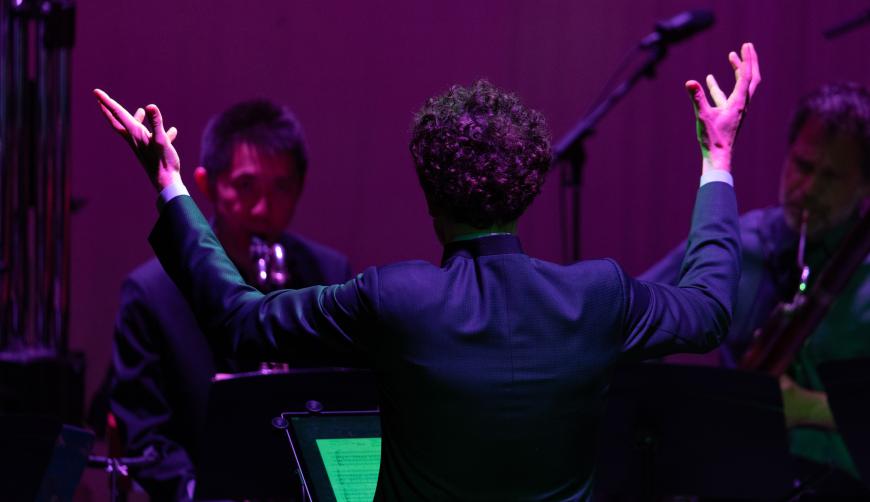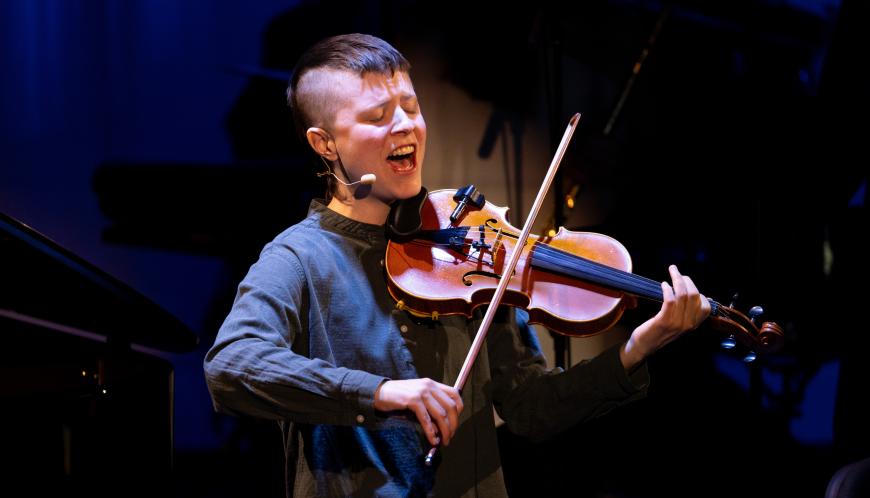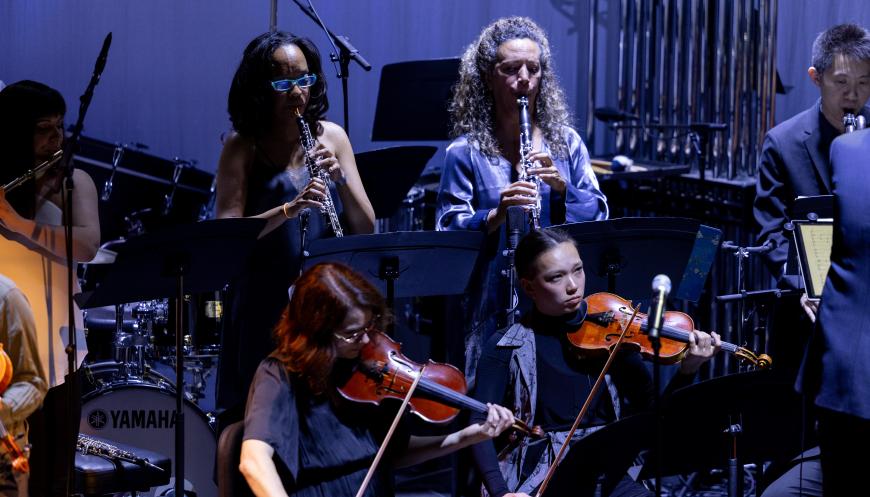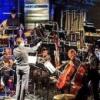
Contemporary classical music is always becoming more omnivorous. As ensembles at the field’s forefront seek out vibrant new modes of music-making, many look to voices outside the classical tradition. This requires players who can adapt to different styles and systems of notation and composers who can conceive of their practices in new arrangements.
Alarm Will Sound, a 21st-century ensemble, is an essential proving ground for such work. On Saturday night at UCLA’s Nimoy Theater, the 20-member group featured work from two artists embracing new modes of notation and expression alongside music by leading composer and flutist Nathalie Joachim.
All three artists have focused on emotionally charged personal narratives, from meditations on belonging to post-breakup grief, and in performance, each of their works had moments of powerful resonance. Alarm Will Sound’s musicians, all of them star players, inhabited each composer’s language fully. But too often the ensemble’s best attribute, its conjuring of diverse sounds and styles, was underutilized. While songs from Joachim’s upcoming sophomore album Ki moun ou ye (to be released in 2024 and presented live in March at Cal Performances) closed the evening on an energetic note, the concert’s momentum was blunted by pieces whose instrumentations and sounds failed to communicate the urgency of their inspirations.

Violinist/vocalist Alyssa Pyper’s Salt Crust, originally a solo piece about their experience as a queer/gender-nonconforming woman raised Mormon, was full of yearning and anguish, often wrung from the stepwise interaction and tension of several musical lines (or one line set against itself on a delay). Stretches featuring Pyper’s vocals in the second and fourth movements evoked the quiet grief of isolation that motivated the composition.
The piece was strongest when embracing this spare sensibility. But energetic gestures that involved more of the ensemble were sometimes waylaid by instrumental choices that sapped the energy and interrupted the momentum. At other times, the expanded instrumentation enhanced the emotional resonance of the piece’s sung text (which Pyper also composed). Adding flutist Erin Lesser to duets between Pyper and violinist Courtney Orlando in the earlier movements gave those sections a crystalline fragility. Timpani figures and ensemble ostinatos defiantly punctuated the finale.
Multi-instrumentalist Eartheater (Alexandra Drewchin), whose work Candied Inferno is the first she has produced without her own vocals, crafted similarly inventive moments. In mapping the emotional topology of a breakup, she summoned brittle textures from the piano and tubular bells and found anger and stridency in brass chorales (led by Tim Leopold’s searing trumpet sound). The dusky, mournful bass flute solo in the fourth movement was emblematic of the close work she conducted with ensemble members to learn about the technical capabilities and limitations of their instruments.

But other stretches of the piece lacked tonal specificity, and long sections with minimal harmonic or textural variation threatened stagnation. The first and fifth movements’ reliance on diatonic, arpeggiated textures in the piano stunted their emotional momentum. And the finale’s euphoric climax, perhaps an approximation of post-grief acceptance, cried out for fuller instrumentation in the percussion and brass to support the piano, violin, and piccolo lines.
Joachim, undoubtedly the evening’s most experienced orchestrator, made the most thorough use of the ensemble’s broad sonic potential in arranging her latest song cycle, which she describes as “a journey of discovery and defining of self.” French hornist Adedeji Ogunfolu and trombonist Michael Clayville maintained sparkling tones while executing dynamic interplay with the percussionists’ groove. Oboist Toyin Spellman-Diaz and clarinetist Mariam Adam skittered virtuosically over warmly supportive string playing.
Joachim’s titular song was full of dense polyrhythmic textures, around which her voice wrapped sinuously. In “Kanpe anba solèy,” the second number, her lower alto register stood strikingly alongside cellist Stefan Freund’s sensitive accompaniment. The evening’s finale, “Zetwal,” set her vocal line against soaring flute descants and a walking-bass-inflected rhythmic drive.
It was a welcome, energetic send-off at the end of the intermission-less concert. Questions of identity and personhood demand intense focus and emotional investment, and it’s easy for these themes to weigh music down. But as in Joachim’s final song, there were moments that took flight.




